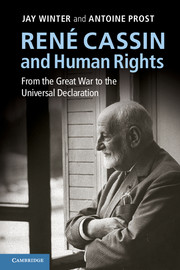Preface and Acknowledgments
Published online by Cambridge University Press: 05 April 2013
Summary
Writing a biography poses particular problems for historians. First, it is impossible to approach this task without a certain sympathy for the person whose life you intend to explore. We are the first to admit that we share the admiration and the respect which René Cassin inspired in many of his contemporaries, as well as a kind of complicity as we traverse the century in his company. In this effort we have been blessed with abundant documentation preserved in archives, in particular the diaries he kept during the Second World War, and in a blessedly legible handwriting.
A historian, though, cannot accept without scrutiny what the subject said about his life and his actions. The meaning we give to our lives at a given moment may look very odd a few years thereafter. That is why we need to adopt a perspective which permits distance from the self-perception of our subject. Without this separation, history becomes hagiography. Biography suffers if it is based on affection or uncritical admiration. Our task is not to instruct the reader by magnifying the achievements of a hero, but in retracing his career and his action, in measuring the impact of his work and its meaning. Biography is a work of critical intelligence and elucidation, neither a panegyric nor an accusation. Our job is to explain what our subject did, why he did it, and to what effect. Moral judgment remains the province of the reader.
- Type
- Chapter
- Information
- René Cassin and Human RightsFrom the Great War to the Universal Declaration, pp. xiii - xviPublisher: Cambridge University PressPrint publication year: 2013



